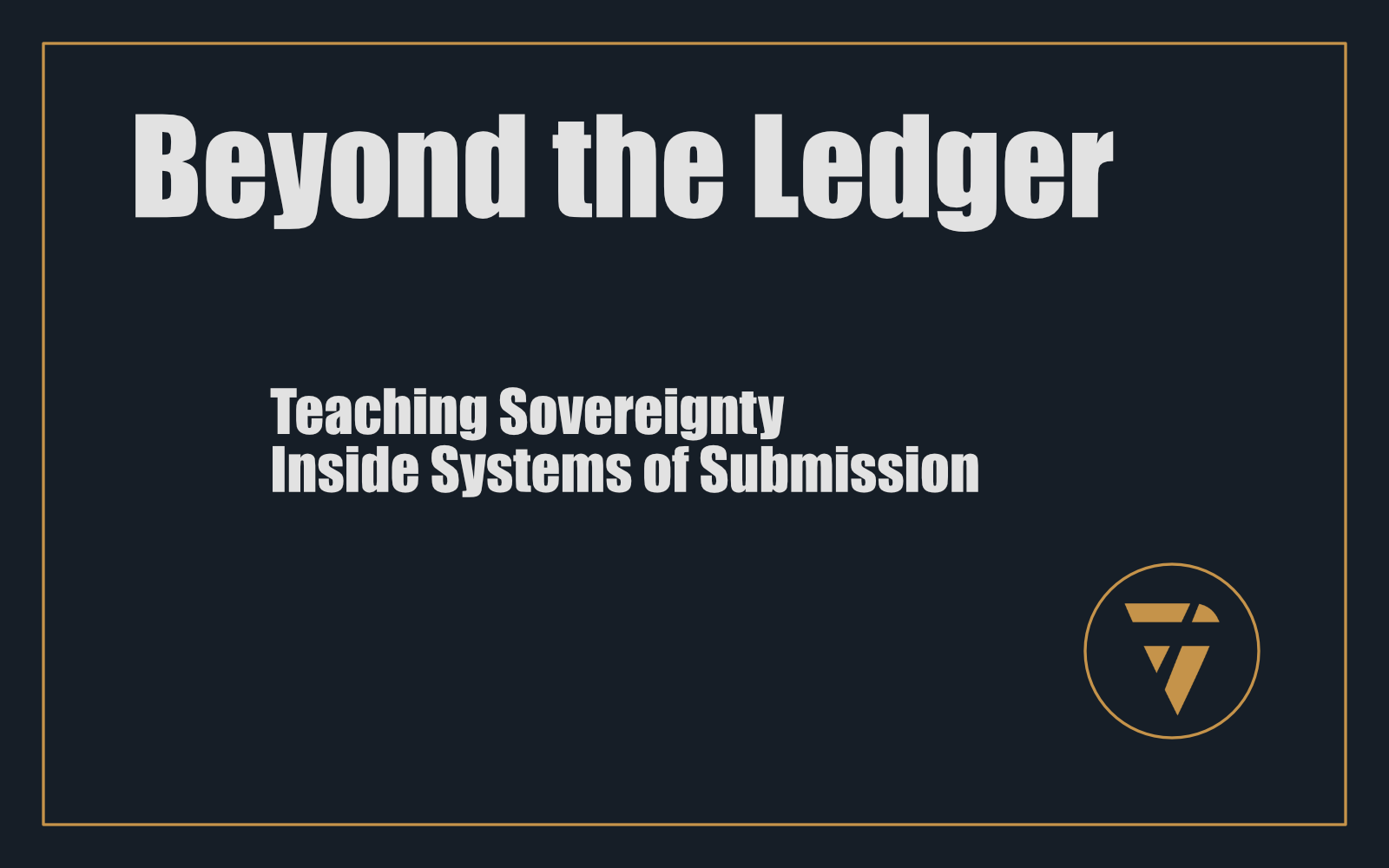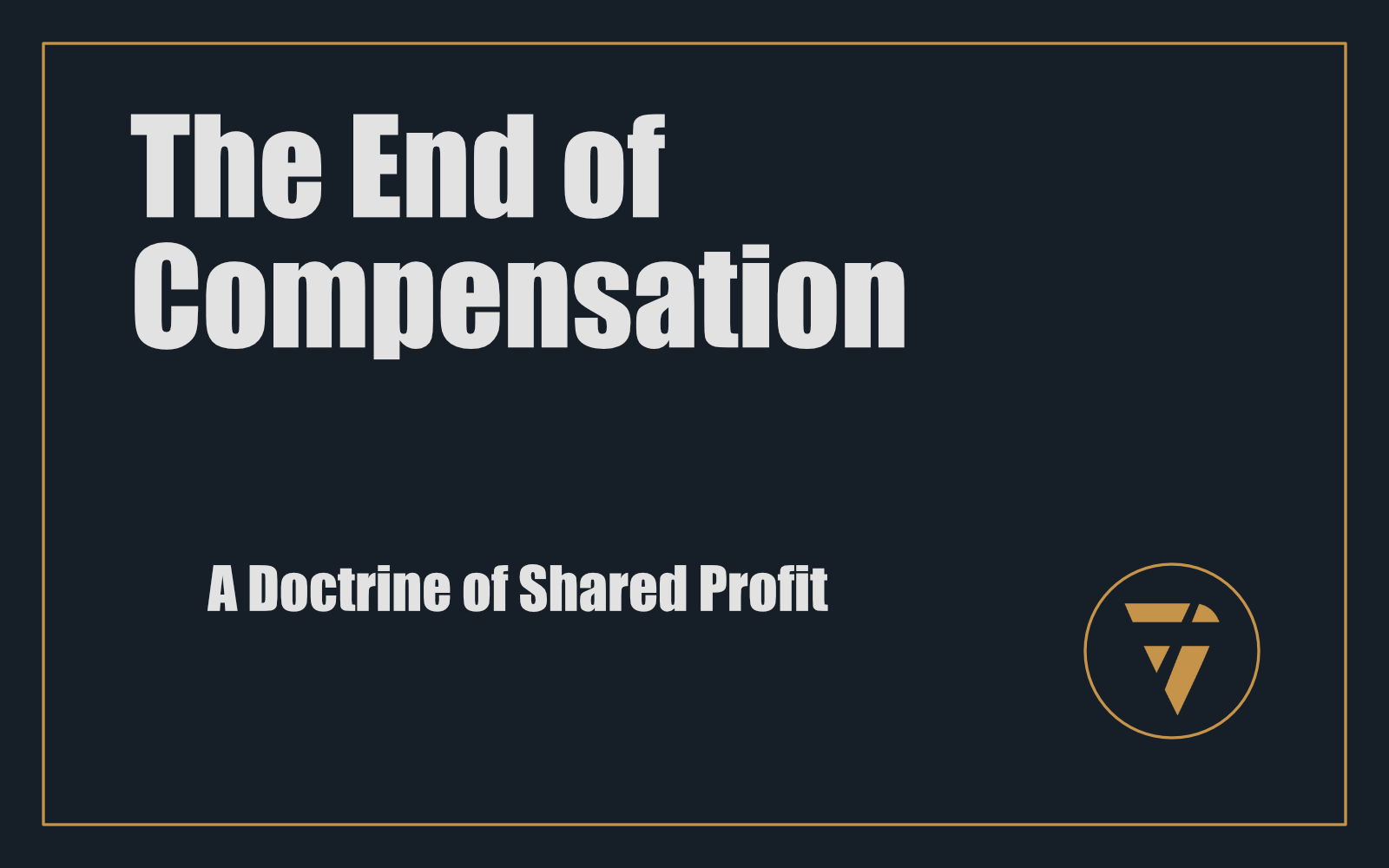Beyond the Ledger

Teaching Sovereignty Inside Systems of Submission
There’s a silence that shows up just after you do something real.
You install shared profit. You open the ledger. You align the roles. You compress the complexity. You replace pay with participation. You expect revolution.
But what you get is… nodding.
Grateful eyes. Nervous questions. And beneath it, a deep-rooted hesitance.
Not resistance. Indifference.
They don’t fight it. They just don’t move.

That’s when you realise: the install worked. But the indoctrination remains.
That’s what Mark Aylward just reminded us.
"You’re missing employee education and indifference. You’re missing a new cultural breeding that must occur. Profit sharing through stock ownership exists but the cultural divide still forces HR to do status quo."
And he’s right.
You Can Build the System. But They Still Live in the Old One.
The IPD/SP model deletes compensation. But the deletion of comp is a surface function. The root doctrine deletes mistrust, hierarchy, and the assumption that someone else is in charge of your reward.
But here’s the tension: deletion is technical. Belief is cultural.
And cultures don’t run on logic. They run on rituals.
What’s more ritualistic than a salary?
Ask yourself:
– How many people know what profit actually means?
– How many know what part of the business they actually impact?
– How many have been trained to ask for money instead of engineer consequence?
We’re not dealing with ignorance. We’re dealing with indoctrination.
And that’s the real cost of legacy comp systems: they teach people to wait.
Wait to be noticed.
Wait to be promoted.
Wait to be allowed to act.
Then we replace the system… and expect immediate agency?
That’s not fair. And it’s not structural.
The Real Problem Isn’t Fear. It’s Passivity.
Galloway said compensation is the hardest problem in business. And I said he was half right.
Here’s the other half:
Compensation systems didn’t just distort economics. They bred dependence.
Every raise reinforced the idea that someone else held the keys.
Every bonus confirmed that obedience mattered more than outcome.
Every HR mediation taught that clarity came from above.
And when you remove those tools?
You don’t get rebellion.
You get waiting.
And waiting inside a sovereign system is fatal.
This Is Why Stock Plans Fail.
Mark said: “Profit sharing through stock ownership exists, but the cultural divide still forces HR to do status quo.”
Exactly.
Because stock is not the system. Stock is a mechanism.
If the person holding the stock still believes they must be granted value… the system hasn’t changed. It’s just wearing a new costume.
You gave them shares, but you didn’t teach them consequence.
You opened the books, but you didn’t teach them how to read.
You gave them ownership. But they still think like employees.
So What Do We Do? We Train Sovereignty.
Sovereignty is not a belief. It’s a behaviour. And behaviours are trained.
So if you’ve installed shared profit — if you’ve opened the ledger and distributed the formula — your work isn’t done.
You now run a post-compensation education cycle.
Here’s how it works:
1. Teach Ledger Literacy
This starts with numbers, not feelings.
Run sessions that teach exactly how profit is calculated, who impacts what, and how flow creates yield.
Use a real cycle. Real revenue. Real shares.
No theory. No abstraction. Just input → flow → output.
Until everyone in the room can say, with confidence:
“This is how I move the number.”
2. Document the Old Scripts
Mark made another critical distinction: implicit vs explicit systems.
Most drift lives in the implicit.
So make it visible.
Host a teardown session where the team surfaces every old behaviour they’ve internalised:
– “I wait for approval.”
– “I don’t talk about money.”
– “I don’t decide pricing.”
– “I stay in my lane.”
Name them. Write them. Burn them.
Then replace each one with the new doctrine:
– “I propose pricing aligned to profit.”
– “I collaborate on ledger optimisation.”
– “I own my functional consequence.”
This isn’t mindset work. This is script replacement.
3. Run Contribution Simulations
Every team runs mock cycles.
– Assign roles.
– Generate revenue scenarios.
– Calculate cost.
– Distribute profit.
Then ask:
“What would you do differently next time to increase your share?”
Now they’re no longer waiting. They’re engineering.
And once they’ve done it once, they’ll do it again. In the real system.
4. Ban the Language of Submission
This part is simple. And brutal.
You ban:
– Raises
– Bonuses
– Salary
– Promotions
– Compensation
– Entitlement
– Gratitude
You replace with:
– Yield
– Flow
– Function
– Return
– Output
– Consequence
– Ownership
If the language of dependency survives, so will the behaviours.
Language isn’t noise. It’s code.
Recode it.
5. Reinforce With Consequence, Not Praise
Don’t thank people for thinking like owners.
Pay them.
When someone finds a leak in the cost model — reward them through yield.
When someone creates a profit delta — spotlight the role, not the person.
We are not building heroes. We’re building habits.
Consequence is not about praise. It’s about pattern reinforcement.
This Is What Comes After Deletion
We deleted comp. Good.
Now delete dependence.
Because you can’t install sovereignty on top of submission.
You can’t scale participation if the people inside still think someone else is in charge.
You can’t build the future if your team is still living in the past.
So don’t just change the ledger.
Change what it means to work.
This is what I’m working on. Tell me what you think, I enjoy the conversation! Subscribe and follow the work in real time.
Thanks!
B

You can delete compensation. But if you don’t delete indoctrination, nothing changes.
Shared profit fails when teams wait to be rewarded — because they were taught that contribution requires permission.
We don’t just train function. We train sovereignty.
Clarity. Compression. Consequence.
PS -








